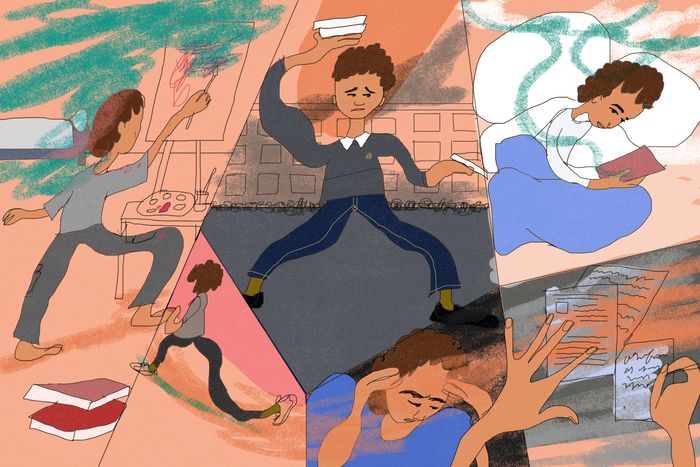
Bad news for uptight pencil pushers like me: The consensus seems to be that you can’t coerce your children into liking school. In fact, an unchill vibe of authoritarian coercion probably makes it worse. As Malcolm Harris wrote recently, the sense that kids and teens have no control over their own lives is at the root of the epidemic of young-adult pessimism and depression.
Kids who cheerfully hustle off to elementary and high school each morning are a balm in a burning world. Orderly, obedient, and virtuous: What more could a parent ask for? But kids who balk at school hand their parents a whole new round of mysterious and horrible responsibilities. How dare they?
Some parents love and honor their school-hating kids. This is usually — and I’m not sorry for saying this — because the kids’ attitudes fulfill some egotistical need on the part of the parents. Is the parent a proud nonconformist, a person who has spent their entire life kicking against the pricks and will never stop even after the pricks have backed off? Almost always. Having grown up around hippies, I know a bunch of people like this. Good for them. But most of us are striving normies, demographically speaking, and we want our kids to “do well” by the measures determined by our social structures. When our kids hate school, it feels like a crime against God.
One approach to helping kids take more pleasure in school seems to be, somewhat counterintuitively, encouraging them to do their own thing rather than their schoolwork. This approach exists on a spectrum. On one end is the practice of letting your kid chill out for an hour after school instead of doing their homework, and on the other end is the unschooling movement.
Unschooling is homeschooling for people who find curricula of any kind too constraining. As Judy Arnall, the author of Unschooling to University, told me, her kids “totally, completely” resisted any form of organized learning. When she took them out of school to homeschool, they ignored her attempts to corral their attention. So, she said, “I just gave up trying to do the curriculum, and we just played for ten years.”
Unschooling is the idea that children learn best when they’re allowed to be fully self-directed, that hitting “milestones” for when to learn something is arbitrary and dumb. Unschooling argues that if you let kids do what they want, they’ll end up learning what they need to know in order to live happy, engaged lives. So what if they don’t learn fractions until they’re 12? The “learning targets” of conventional schools are designed to give taxpayers proof their tax dollars are “working.” Unschooling eschews accountability of that kind and centers the child’s inner compass.
This all holds limited appeal to me because its approach is generally individualistic, a horseshoe-theory meeting of radical progressive permissiveness and separatist libertarian self-determinism. People who make the case for unschooling, like the filmmaker Astra Taylor, who was unschooled until she was 13, are usually exceptional people with unconventional families. Most of us are ordinary people with jobs. We’re foot soldiers of conformity, and we’re imprisoned by our mortgages, student debts, limited skill sets, and sedentary habits. You can pity us and you can call us “sheeple,” but unless you’re willing to forgive our debts, we’re going to keep working, and we won’t have the time to mind our kids while they unschool themselves.
Arnall admits that child care can be a problem while unschooling if you have to leave the house to work. She was part of a child-care co-op, but the other kids attended school, so few parents were available to care for her kids during school hours. In the midst of a care crisis across North America, the idea of introducing more child-care needs into one’s life is quite frankly offensive, and many readers will certainly slam the book shut on unschooling for that reason alone.
But despite my aversion to the exclusion built into unschooling, I can’t dismiss its principles completely. In 2018, the neuropsychologist William Stixrud and the test-prep expert Ned Johnson published The Self-Driven Child: The Science and Sense of Giving Your Kids More Control Over Their Lives. The book is based on much of the same kind of data we use today to talk about the pandemic-era mental-health crisis among young people, so clearly this crisis is only partly about the pandemic’s lingering effects. Kids have been feeling as if they had no control over their lives for years, and the authors argue that parents’ best intentions play an important unintended part in the crisis. I must award a point, however begrudgingly, to the unschooling side.
The authors convincingly argue that when we feel “in control,” our prefrontal cortex is able to manage our amygdala, where fight-or-flight reflexes emanate. The experience of control allows us to manage our own emotions. Likewise, having autonomy over our time helps develop feelings of motivation. Herding kids through an education system that offers them limited choice as to how their time is spent and virtually no choice over what they learn would seem to be harming kids’ mental health. Kids who experience mastery and satisfaction from the structure of the school day will coast through — but that might be fewer kids than one would hope.
In the wake of the pandemic, the entire concept of office work is undergoing a reappraisal, but the school day isn’t. Office workers prefer the self-determination that comes with hybrid work and want to be trusted to manage their time appropriately. Most officer workers’ morale suffers when they’re under constant surveillance — is it any wonder that many kids feel the same way about school? School is training for the office, so if we change the office, when will we change school?
Unschooling advocates will tell you their approach is underresearched because academics are “afraid of what they might find out.” It’s quaint when people think that (“They’re afraid of us because we might blow their minds”). It’s what Deadheads say about people who hate the Grateful Dead. The persistent marginality of the unschooling movement is no mystery: It’s defined as a resistance to organized learning, and governments are mandated with the organized education of their citizens. The reason governments have no incentive to critically reappraise pedagogy is that, unlike office workers, primary-school students can’t quit en masse or unionize (yet). Without that threat, the status quo feels unmovable.
It turns out that kids who love school might benefit from a change just as much as kids who hate it. My older son is in seventh grade, which in Quebec is the first year of high school. Earlier this fall, his school held an information night for parents of seventh-graders that was intended to give us advice for helping our kids through the transition to high school. The school has a good reputation, and despite being public, there’s an entrance exam to get in. It was a roomful of parents whose kids had, up until recently anyway, loved going to school.
I attended the info night with my friend Laura, a fellow parent of a seventh-grader. Both of us agree that while it’s satisfying to be sending our kids to a good school, it would be nice if the school made less of a big deal about it — for the kids’ sakes. But these days it seems like, if a kid enjoys school enough to be considered a “high achiever,” they’re doomed to circulate in a hothouse environment full of stress. What if there were good public schools that didn’t put a ton of pressure on the students? If that seems impossible, maybe we should ask ourselves why.
We took our seats in the cafeteria alongside about 50 other parents. One of the teachers presenting was a former guidance counselor, an older man with an easy sense of humor who at moments was so emotionally engaged with his subject that he sounded on the verge of tears. The point he made throughout his talk was that, whatever is happening with schoolwork, our main responsibility as parents is to maintain a good relationship with our kids. “It’s all about the relationship,” he repeated.
These smart kids will experience stress, the teachers told us. They will fear failure. It’s inevitable. Homework will constrain their lives. They will become bound to their desks. It is going to suck — but such is the lot of the academically elite child, and we were all lucky to be gathered there, a conscientious group of try-hards ourselves. Give the kids a break, the former guidance counselor advised us. Let them take a night off from homework from time to time. “Let them be kids,” he pleaded.
On the drive home, Laura and I went over what we’d learned. On the one hand, our kids were going to have a ton of homework for the foreseeable, and they’d better get used to it. Evaluations would cause them routine anxiety. Instead of putting additional pressure on them, parents should encourage their kids to relax and have fun. The school was asking parents to repair some of the damage that’s routinely doled out in the name of academic rigor.
For parents of kids who hate school, the task is the same: Just help them feel as if they have some influence over how they spend their own time. Maybe that means forgoing a tutor or abandoning hopes that a kid who hates school will turn out to be a secret SAT genius. Maybe failure is an option.
If motivation comes from autonomy and well-being comes from a sense of control over one’s surroundings, I guess every kid, regardless of how they feel about school, deserves the same chance to figure a few things out for themselves.
More From This Series
- Is Annoyance the Most Romantic Emotion?
- Trad or Not, We’re All Nostalgic for a Fake Past
- Should Kids Really Learn About Getting Rich?


